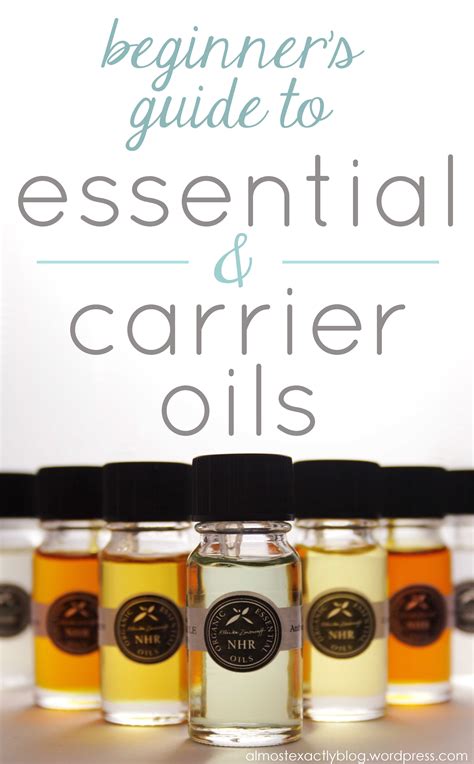What are Essential Oil Carrier Oils?
Essential oil carrier oils are vegetable oils that are used to dilute essential oils before applying them to the skin. They help to reduce the concentration of the essential oil and make it gentler on the skin, preventing irritation or allergic reactions. Carrier oils also help to prolong the evaporation of essential oils, allowing their therapeutic benefits to last longer.

Types of Carrier Oils
There are numerous types of carrier oils available, each with its own unique properties and benefits. Some of the most popular carrier oils include:
- Almond oil: Rich in vitamins A, E, and K, almond oil is lightweight and non-greasy, making it suitable for all skin types.
- Argan oil: Known for its high concentration of antioxidants and fatty acids, argan oil is particularly beneficial for dry, sensitive, and aging skin.
- Avocado oil: High in vitamins A, D, and E, avocado oil is deeply nourishing and moisturizing, making it ideal for dry or damaged skin.
- Coconut oil: Rich in fatty acids and vitamins E and K, coconut oil is antibacterial, antifungal, and moisturizing, making it suitable for all skin types.
- Jojoba oil: A plant-based wax rather than an oil, jojoba oil is similar to the skin’s natural sebum and is non-comedogenic, making it ideal for oily or acne-prone skin.
Benefits of Using Carrier Oils
Using carrier oils with essential oils offers several benefits:
- Reduced skin irritation: Diluting essential oils with carrier oils minimizes the risk of skin irritation or allergic reactions, making them safer for topical application.
- Extended evaporation: Carrier oils slow the evaporation of essential oils, allowing their therapeutic effects to last longer.
- Enhanced absorption: Carrier oils facilitate the absorption of essential oils into the skin, increasing their bioavailability.
- Increased skin health: Many carrier oils are rich in vitamins, minerals, and fatty acids, providing additional nourishment and benefits to the skin.
Choosing the Right Carrier Oil
The choice of carrier oil depends on the intended use and skin type. Here are some guidelines:
- Dry skin: Opt for nourishing and moisturizing carrier oils like avocado, almond, or jojoba oil.
- Oily skin: Choose lightweight and non-comedogenic carrier oils like grapeseed or jojoba oil.
- Sensitive skin: Pick hypoallergenic and gentle carrier oils like coconut or almond oil.
- Specific skin conditions: Consult with a healthcare professional or aromatherapist to determine the most suitable carrier oil for specific skin conditions like eczema or psoriasis.
How to Use Essential Oil Carrier Oils
To use essential oil carrier oils, follow these steps:
- Choose a carrier oil: Select the carrier oil based on your skin type and intended use.
- Determine dilution ratio: The dilution ratio depends on the essential oil and skin sensitivity. Generally, a 2-5% dilution is recommended for topical application (2 drops of essential oil per 10ml of carrier oil).
- Mix essential oil and carrier oil: Combine the diluted essential oil into the carrier oil and stir well.
- Apply to skin: Apply the diluted essential oil mixture to the desired area of skin and massage gently.
- Test for sensitivity: Before applying to larger areas, perform a patch test on a small area of skin to check for any adverse reactions.
Tables
Table 1: Common Carrier Oils and Their Benefits
| Carrier Oil | Benefits |
|---|---|
| Almond oil | Lightweight, non-greasy, suitable for all skin types |
| Argan oil | Antioxidant-rich, nourishes dry, sensitive, and aging skin |
| Avocado oil | Deeply nourishing, moisturizes dry and damaged skin |
| Coconut oil | Antibacterial, antifungal, moisturizing, suitable for all skin types |
| Jojoba oil | Plant-based wax, non-comedogenic, suitable for oily and acne-prone skin |
Table 2: How to Choose the Right Carrier Oil for Your Skin Type
| Skin Type | Recommended Carrier Oils |
|---|---|
| Dry skin | Avocado oil, almond oil, jojoba oil |
| Oily skin | Grapeseed oil, jojoba oil |
| Sensitive skin | Coconut oil, almond oil |
| Specific skin conditions | Consult healthcare professional or aromatherapist |
Table 3: Dilution Ratios for Essential Oils
| Essential Oil | Skin Sensitivity | Dilution Ratio |
|---|---|---|
| Lavender | Low | 1-3% |
| Peppermint | Medium | 2-5% |
| Tea Tree | High | 1-2% |
Table 4: Safety Tips for Using Essential Oils with Carrier Oils
- Perform a patch test before applying to larger areas of skin.
- Always dilute essential oils in a carrier oil before applying topically.
- Avoid contact with eyes, mucous membranes, or broken skin.
- Store essential oils and carrier oils in a cool, dark place.
Tips and Tricks
- Choose organic carrier oils: Organic carrier oils are free from pesticides and other harmful chemicals, ensuring purity and quality.
- Experiment with different carrier oils: Explore various carrier oils to find the ones that best suit your skin type and preferences.
- Create custom blends: Mix different carrier oils and essential oils to create personalized blends tailored to your specific needs.
- Use essential oil carrier oils in DIY skincare products: Incorporate carrier oils into homemade lotions, serums, and bath salts to enhance their therapeutic benefits.
Why Essential Oil Carrier Oils Matter
Essential oil carrier oils are essential for safe and effective topical use of essential oils. They protect the skin from irritation, extend the therapeutic effects of essential oils, and enhance their absorption. Choosing the right carrier oil based on skin type and intended use is crucial to maximize the benefits and minimize risks.
Conclusion
Essential oil carrier oils are indispensable companions to essential oils, allowing us to harness their therapeutic powers for skin care and wellness without compromising skin health. By understanding the benefits, choosing the right carrier oil, and following proper application techniques, you can enjoy the transformative effects of essential oils with peace of mind.
